#Solid Waste Segregation
Explore tagged Tumblr posts
Text
Solid waste segregation plays a pivotal role in improving recycling processes by ensuring that waste materials are sorted effectively. This practice not only streamlines recycling but also supports sustainable waste management practices. Read.
#Solid Waste Management Authorization#Solid Waste Segregation#industrial waste management#industrial waste segregation#EPR Authorization For Battery Waste#epr battery waste management#waste management#benefits of waste disposal
0 notes
Text
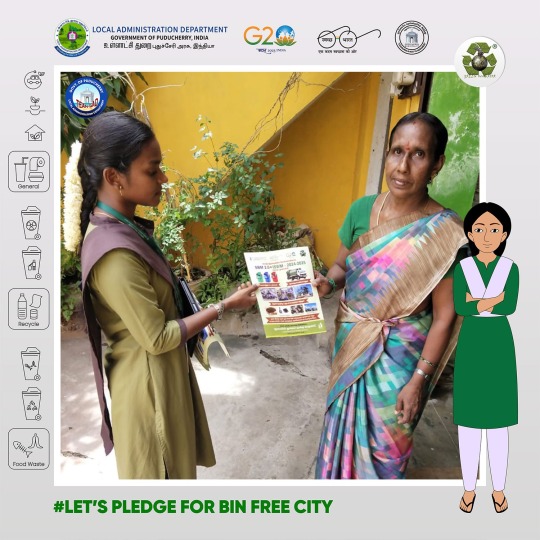
Do Your Part: Separate Smart! Keep our planet clean by segregating your daily waste.
For more info:
#pondicherry#pondicherrymunicipality#pondicherrylovers#recycling#segregation#solid waste management#garbage#reduce reuse recycle#no plastic#environment
0 notes
Text
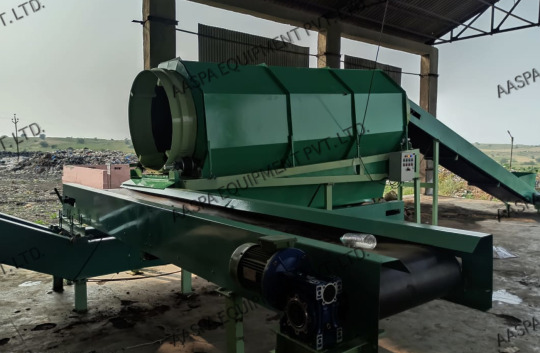
Solid Segregation Waste Plant
0 notes
Text
What India’s Draft Solid Waste Management Rules, 2024 Mean for Businesses and Urban Growth

India is undergoing a silent revolution in how it views and handles waste — and the latest Draft Solid Waste Management Rules, 2024 could be a game-changer for urban sustainability, corporate accountability, and compliance standards. If you're part of a business, municipality, or regulatory body, it’s time to understand what these new draft rules could mean for you.
Why Solid Waste Management Needs a New Chapter
India’s rapid urbanization is creating a mountain of waste — literally. Our current waste management systems are struggling to keep up, especially with increasing population density, rising consumerism, and inconsistent municipal governance.
The 2024 draft rules are designed not just as a corrective measure but as a proactive framework to shift India toward a circular economy. They aim to tighten responsibilities, redefine roles, and enhance monitoring — giving both citizens and corporations clear obligations.
Key Highlights from the Draft Solid Waste Management Rules, 2024
Here are some of the most critical changes proposed in the draft:
Enhanced segregation at source: The draft mandates stricter rules on waste segregation by households, businesses, and institutions.
Increased responsibilities for bulk generators: Large establishments, including offices and housing societies, must now manage their waste more comprehensively, from segregation to composting.
Extended Producer Responsibility (EPR): This provision, which also applies to sectors like plastic and electronics, will require producers to take full accountability for the lifecycle of their products.
Penalties for non-compliance: Fines and sanctions will become more stringent, including direct accountability of urban local bodies and individual offenders.
Mandatory use of technology: The new rules emphasize the digital tracking of waste collection, segregation, and disposal — opening doors for smart compliance software.
👉 For a full overview of the official draft, read this detailed analysis of the Draft Solid Waste Management Rules, 2024.
How Will This Impact Indian Businesses?
Businesses will be significantly impacted in several ways:
Compliance is no longer optional: Whether you’re a hospitality giant, tech startup, or retail brand, these rules mean you'll need proper documentation and compliance workflows.
Increased costs, but smarter investment: Setting up internal waste management and documentation systems may add to operational costs, but they will be necessary to avoid penalties and maintain CSR credibility.
Scope for innovation: This could be an opportunity for businesses to innovate in recycling, green packaging, and sustainable logistics.
Why Compliance Software Will Be a Critical Ally
Managing these expanded responsibilities manually is nearly impossible. This is where a strong compliance management system becomes essential.
Smart solutions like regulatory compliance software help businesses automate tracking, ensure timely filings, and generate audit trails — everything you need to remain on the right side of the law. For example, Lawrbit’s platforms are already helping organizations navigate India’s complex and evolving regulatory environment with ease.
Whether you’re tackling solid waste compliance or managing environmental obligations, the right compliance software can save time, minimize risks, and drive accountability.
Final Thoughts
The Draft Solid Waste Management Rules, 2024 aren’t just another regulatory update — they’re part of India’s broader push toward responsible urban growth, sustainability, and corporate accountability. Every stakeholder — from waste generator to government — must participate with transparency and foresight.
And for businesses that want to stay ahead, now is the time to invest in smart compliance solutions and waste audit frameworks.
1 note
·
View note
Text
How does Gruner Renewable convert municipal solid waste (MSW) into clean biogas?
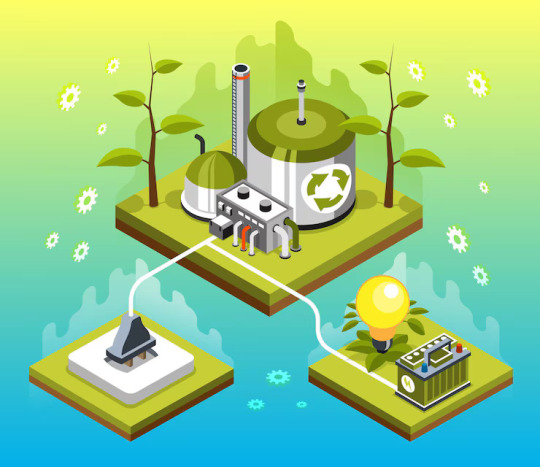
In a world increasingly threatened by climate change and pollution, sustainable waste management has become a pressing need. One of the most promising solutions to urban waste problems lies in transforming municipal solid waste (MSW) into renewable energy. Gruner Renewable, a leader in clean energy solutions, has pioneered a revolutionary method for boldBio Gas Generation from MSWbold, helping cities manage their waste while generating clean, green fuel.
What is Municipal Solid Waste (MSW)?
Municipal Solid Waste (MSW) refers to the everyday garbage collected from households, commercial buildings, schools, and public spaces. It includes a mix of biodegradable waste (like food scraps, garden waste, and paper) and non-biodegradable components (like plastics, metals, and glass).
In India, millions of tons of MSW are generated daily, leading to overfilled landfills, foul odors, disease outbreaks, and greenhouse gas emissions. The conventional disposal methods — dumping and burning — not only waste valuable resources but also harm the environment.
This is where Gruner Renewable’s innovation comes in — offering a cleaner, smarter solution through Bio Gas Generation from MSW.
The Gruner Renewable Process: From Waste to Energy
Gruner Renewable’s process involves a well-structured, science-backed system that transforms organic fractions of MSW into high-quality biogas. Here’s a breakdown of the process:
1. Waste Collection and Segregation
The journey starts with the collection of municipal solid waste. However, not all MSW is suitable for biogas production. That’s why Gruner emphasizes the importance of waste segregation at the source. Biodegradable materials like food waste, agricultural residues, and paper are separated from plastics, glass, and metals.
Advanced mechanical and manual sorting processes ensure that only organic-rich fractions enter the digestion system.
2. Pre-treatment of Organic Waste
Once segregated, the organic material undergoes shredding to reduce its size and increase surface area for microbial action. Water may be added to create a slurry, improving the efficiency of the digestion process.
This pre-treatment ensures uniformity, removes contaminants, and sets the stage for optimal anaerobic digestion.
3. Anaerobic Digestion
This is the heart of Bio Gas Generation from MSW. The prepared organic slurry is fed into a large anaerobic digester — an oxygen-free chamber where naturally occurring bacteria break down the waste over several days.
During this biological process, the microbes digest the organic matter and release methane-rich biogas, along with a nutrient-rich residue called digestate.
4. Biogas Collection and Purification
The raw biogas produced contains impurities like carbon dioxide (CO₂), hydrogen sulfide (H₂S), and water vapor. Gruner Renewable uses advanced purification technologies like scrubbing, membrane separation, and pressure swing adsorption (PSA) to upgrade the biogas.
The result? Clean, high-purity biomethane that can be used as:
● Fuel for cooking
● Electricity generation
● Transportation (as CNG substitute)
● Industrial thermal applications
5. Utilization of Digestate
The leftover digestate is not waste — it’s a valuable by-product. Rich in organic nutrients, it is processed into organic manure or compost. This contributes to sustainable agriculture by reducing dependence on chemical fertilizers.
Why Gruner Renewable’s Model is a Game-Changer
Reduces Landfill Waste
By diverting a large portion of biodegradable MSW from landfills, Gruner helps reduce the strain on municipal waste systems and limits harmful emissions like methane.
Clean Fuel Production
Biogas is a clean, renewable fuel. It burns without producing harmful pollutants, making it ideal for sustainable energy use.
Decentralized Waste Management
Gruner Renewable’s plants can be set up near cities or industrial zones, reducing the need for long-distance waste transport and allowing localized energy production.
Job Creation and Economic Impact
Each plant creates jobs in waste collection, sorting, operations, and maintenance, supporting local communities and informal workers.
Environmental and Social Benefits
● Reduction in Greenhouse Gas Emissions: Methane captured from waste is used as fuel rather than escaping into the atmosphere.
● Improved Public Health: Cleaner surroundings and fewer open dumpsites help reduce diseases and foul air.
● Support for Circular Economy: Waste is transformed into resources — fuel and fertilizer — closing the resource loop.
Real-World Impact: Case Study Example
In one of the pilot projects in a Tier-2 city, Gruner Renewable installed a biogas plant capable of processing 50 tons of MSW per day. Within months:
● The city reported 30% less garbage reaching landfills.
● Biogas produced powered over 1,000 homes.
● Local farmers began using organic manure made from digestate.
This proves that Bio Gas Generation from MSW is not just theory — it’s a working, scalable solution.
Challenges and Gruner’s Solutions
While the concept is powerful, MSW-to-biogas systems do face real-world challenges:
Challenge
Gruner’s Approach
Unsegregated waste
Promoting awareness, partnering with municipalities for segregation drives
Odor management
Using sealed digesters, filters, and proper aeration systems
Space for setup
Offering modular plant designs suitable for urban peripheries
Fluctuating waste volume
Scalable tech that adapts to daily input variations
Conclusion
Gruner Renewable is not just creating energy — it’s creating a cleaner future. By converting waste into wealth, the company showcases the immense potential of Bio Gas Generation from MSW as a sustainable solution for India’s mounting waste crisis.
It’s time to reimagine garbage not as a burden, but as a resource waiting to be tapped. Gruner Renewable is leading that transformation — one biodegradable bag at a time.
0 notes
Text
Alternatives to Traditional Waste Disposal: The Rise of Incinerators in Kerala
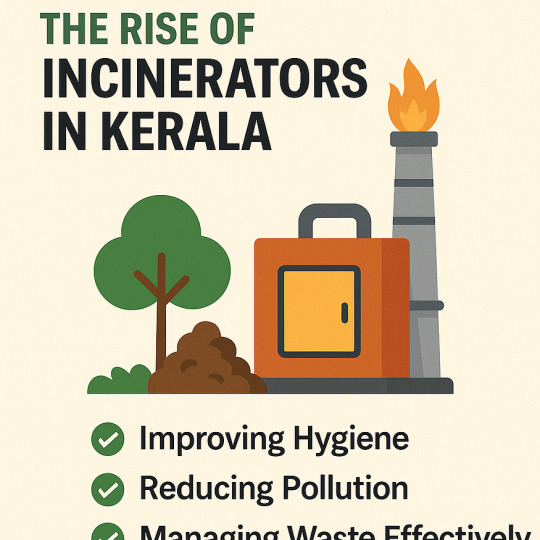
Kerala, known for its natural beauty and high population density, has long struggled with effective waste management. With traditional dumping methods leading to pollution and health risks, incinerators in Kerala are now gaining popularity as a cleaner, faster, and more efficient waste disposal method.
What Are Incinerators?
Incinerators are machines designed to burn waste materials at high temperatures, converting them into ash, flue gas, and heat. They are especially useful for disposing of non-recyclable waste, biomedical waste, and materials that pose health risks when dumped openly.
Why Kerala Needs Incinerators
Kerala produces thousands of tons of waste daily. Open dumping and landfill sites not only consume valuable land but also emit methane and leachate, contaminating water and air.
Here’s how incinerators are offering a solution:
🔥 Rapid Waste Reduction: Reduces waste volume by up to 90%.
🌿 Minimizes Land Use: Less dependency on landfill space.
🦠 Sanitary Disposal: Controls the spread of harmful pathogens.
🏙️ Urban Utility: Suitable for cities and towns with limited space.
Types of Incinerators Used in Kerala
Municipal Waste Incinerators — For general solid waste from homes and markets.
Biomedical Waste Incinerators — For safe disposal of hospital and clinic waste.
Industrial Incinerators — For factories and hazardous material management.
Portable Incinerators — For schools, hostels, and small institutions.
Government and Private Initiatives
Various municipalities and private organizations in Kerala have begun adopting incineration technologies. Some panchayats are even integrating portable incinerators into schools and public toilets to maintain hygiene.
The Suchitwa Mission, Kerala’s flagship cleanliness program, has also promoted small-scale incinerators in government buildings and residential complexes.
Concerns and Best Practices
While incinerators solve many problems, they must be properly managed:
Ensure emission controls are in place to avoid air pollution.
Use advanced filters to capture harmful particles.
Combine incineration with segregation and recycling for best results.
Conclusion
As Kerala continues to grow, so does its waste. Traditional methods are no longer sufficient or safe. The rise of incinerators in Kerala marks a shift toward more modern, hygienic, and space-saving waste management practices — helping the state protect its environment and public health.
#biogas in kerala#biogas plant for home#biogas#kerala#incinerator manufacturers in kerala#portable biogas plant for home#incinerators in kerala
0 notes
Text
What Is a Trommel Screen Machine and How Does It Work?
Waste management has become a crucial aspect of sustainable living as urbanization and industrialization increase in the world. Proper waste handling and segregation help in recycling, protecting the environment from pollution, or optimizing landfill resources. Of the various waste handling equipments, the Trommel Screen Machine has uplifted due to its versatility and effectiveness.
In this article, we will cover what a Trommel Screen Machine is and how it operates as well as how it enhances better waste segregation through the solutions offered by Envcure Technocrat LLP.
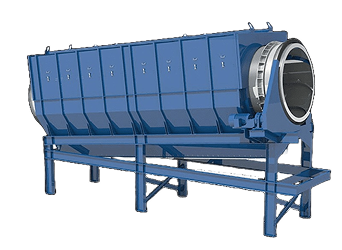
What Is a Trommel Screen Machine?
A Trommel Screen Machine is a mechanical screening mainly found in the mines, recycling areas, and waste processing industries. The machines basically constitute a rotating cylindrical drum with perforations on its sides. The main purpose of the Trommel Screen Machine is to sift materials on the basis of size, which makes it a perfect application for waste segregation and recovery.
The screen drum of the Trommel Screen Machine rotates with material fed into one end of the drum. Smaller particles pass through the perforations, whereas large materials are kept inside and moved towards the other end. The sorting and segregation of materials by this means enhance the handling of wastes.
How Does a Trommel Screen Machine Work?
Operation of the Trommel Screen Machine is a very simplistic and very effective mechanism, utilizing the principles of screening and centrifugal separation. The following is a stepwise description of the process:
Material Feeding: Waste or mixed aggregates are fed into the Trommel Screen Machine inlet. Usually, this is done by conveyor or loader.
Drum Rotation: The drum is fitted with perforated screens and is rotated about its axis. The tumbling action exposes all surfaces of the material to the screen openings and allows those of smaller sizes to pass through.
Screening Process: As the waste travels inside the drum, separation occurs between various sized materials-finer ones drop through the screens, and the larger ones keep moving along the drum length.
Material Discharge: The separated wastes gutter out of the machine through two separate chutes, which allow rapid collection and further processing. This quick and efficient mechanism makes segregation of waste possible.
Highly adaptable in nature, the Trommel Screen is able to treat myriad waste types-from municipal solid wastes, compost, construction debris, and much more.
Also visit our different types of waste handling solutions.
Applications in Waste Segregation
The Trommel Screen Machine represents a crucial element in a modern waste management system. From municipal, industrial, or construction waste segregation is necessary to improve the recycling rates and ease the pressure on the landfill.
Municipal Waste: Separation of organic and inorganic substances with the aim of diverting recyclable and compostable materials to landfills.
Recycling Plants: Improvement of sorting of plastics metals, and other recyclables.
Composting Facilities: Separation of fine compost from materials.
Construction Sites: Soil, stone, and recyclable debris.
Having a Trommel Screen Machine installed allows a company to be more efficient with less manual labor in sorting waste with a much purer output.
Waste Handling Equipments and Their Importance
For modern waste management, different pieces of waste handling equipment are considered. Examples include shredders, conveyors, balers, and screeners. The Trommel Screen Machine in particular is recognized for processing huge volumes with relatively high rates of efficiency.
Versatility: It is suitable for different types of materials and can also be changed to suit changing waste streams.
Cost-effectiveness: Using this equipment reduces the manual labor of sorting wastes and lowers overhead costs of operations.
Quality Output: This equipment assists in producing clean segregated materials and thus enhances their value for recycling and reuse.
Reliable waste handling equipment is the foundation on which a waste processing center builds its sustainability and adherence to regulations.
Contact us today to learn more about our advanced Trommel screen machine solutions.
Why Choose Envcure Technocrat LLP for Trommel Screen Machines?
Choosing a trusted and innovative partner when it comes to investing in waste handling apparatus like the Trommel Screen Machine is a must. Envcure Technocrat LLP heads the industry in designing and manufacturing robust and high-performance Trommel Screen Machines suitable for various waste management requirements.
Industry Expertise: Envcure brings with it many years of experience and hold deep insights into waste management problems.
Customization: The solutions are customized to the end-user's requirements to promote the maximum efficiency in waste segregation.
After-sales Support: Comprehensive service after installation guarantees the smooth operation of the equipment.
Sustainability Focus: Being environmentally responsible is a firm commitment of Envcure, which leads to innovative endeavors to deliver eco-friendly solutions.
By partnering with Envcure Technocrat LLP, businesses can benefit from new technologies and unmatched reliability in Trommel Screen Machine solutions.
Conclusion
A Trommel Screen Machine is necessary equipment today with efficient, automatic, and effective waste segregation mechanisms. With the backing of industry players such as Envcure Technocrat LLP, companies can automate some of their waste management processes and do a bit toward sustainable operations.
Investing in the Trommel Screen Machine will not only make waste processing easier but will also go a long way in enhancing a cleaner, greener environment.
0 notes
Text
Apartments in Dabolim | Spacious & Affordable Homes by Providenthousing
The Growing Demand for Apartments in Dabolim
Dabolim, a scenic location in Goa, has emerged as one of the most preferred destinations for residential investment, especially for those looking to experience the perfect mix of tranquility and modern convenience. Apartments in Dabolim are in high demand due to the region’s well-balanced environment, combining the serenity of coastal living with robust infrastructure and connectivity. The area’s development has witnessed a steady rise in real estate activity, largely influenced by improved transportation links, lifestyle amenities, and its close proximity to Goa’s key urban areas.
Prime Location and Seamless Connectivity
Apartments in Dabolim benefit from their strategic location, being close to Goa International Airport, the Vasco Railway Station, and NH66. This location advantage makes commuting convenient for professionals, families, and frequent travelers. Moreover, Dabolim offers easy access to major destinations such as Panaji, Margao, and the commercial hubs of Vasco. The surrounding infrastructure supports a well-connected lifestyle, with educational institutions, healthcare centers, and entertainment zones all located within a short drive.
Modern Architecture and Smart Interiors What sets the apartments in Dabolim apart is the modern architecture and thoughtful design that cater to the evolving lifestyle needs of urban families. Developments such as Provident Adora de Goa exemplify this with their meticulously crafted living spaces. The 1 BHK homes here are designed for maximum space efficiency while offering premium aesthetics. From spacious balconies to airy bedrooms and modular kitchens, every detail is curated to enhance the comfort and visual appeal of these residences.
Lifestyle Amenities for Every Resident One of the key reasons why homebuyers are choosing apartments in Dabolim is the wide array of lifestyle amenities available in these projects. Providenthousing includes everything from a state-of-the-art clubhouse and gymnasium to a swimming pool, jogging tracks, and multipurpose courts. Children’s play areas and senior citizen zones ensure that residents of all age groups have spaces designed specifically for their comfort and recreation. The focus is on building vibrant communities rather than just providing living spaces.
Safety, Sustainability, and Innovation Safety and sustainability are at the core of Providenthousing’s residential philosophy. Apartments in Dabolim are part of secure gated communities equipped with 24/7 surveillance, intercom systems, and access control. In addition, the properties incorporate green initiatives such as rainwater harvesting, solar lighting, and waste segregation systems. The integration of smart home technologies like keyless entry and app-controlled appliances further enhances the daily experience of residents.
Value Appreciation and Investment Potential Dabolim’s residential market has seen consistent appreciation over the years. This trend is expected to continue with the government’s push for infrastructure development and the area’s increasing popularity among working professionals and NRIs. Investing in apartments in Dabolim, especially with trusted developers like Providenthousing, offers a solid return on investment—be it through rental yields or capital gains. The long-term prospects are promising due to the region’s transformation into a lifestyle and business hub.
Community Living with Coastal Charm Living in Dabolim offers a unique experience where community living merges with the calm of Goa’s coastline. Apartments here are not just about interiors—they also offer a sense of belonging. With well-maintained open spaces, community events, and shared facilities, residents enjoy a lifestyle that balances privacy with sociability. The coastal setting, along with lush green surroundings, elevates the emotional and physical well-being of the residents.
Conclusion Choosing Apartments in Dabolim is a step towards a lifestyle that harmonizes comfort, convenience, and connectivity. With Providenthousing leading the way through exceptional design, premium amenities, and a commitment to sustainable living, homebuyers can expect not just a house but a holistic living experience. As the locality continues to grow in stature and infrastructure, investing in an apartment here ensures long-term satisfaction and value. Providenthousing’s presence in Dabolim strengthens the region’s appeal, offering buyers a secure and enriching place to call home.
0 notes
Text
Waste management plays a vital role in protecting the environment and ensuring a cleaner future. Without proper disposal and recycling methods, waste accumulates, leading to pollution, resource depletion, and health hazards. Effective strategies, such as industrial waste management and industrial waste segregation, help minimize environmental impact while promoting sustainable development. Businesses and industries must follow regulatory requirements, including Solid Waste Management Authorization and EPR Authorization For Battery Waste, to ensure responsible waste disposal. Read: https://scholarsglobe.com/blog/proper-waste-management-crucial-for-environmental-sustainability/
#legal#legal services#tax#industrial waste management#industrial waste segregation#Solid Waste Management Authorization#waste management certificate#EPR Authorization For Battery Waste#battery waste epr registration#waste management#advantages of waste management
0 notes
Text

நெகிழியின் பயன்பாட்டை தவிர்த்து கடல்வாழ் உயிரினங்களை பாதுகாப்போம்.
#pondicherry#pondicherrymunicipality#pondicherrylovers#recycling#segregation#solid waste management#garbage#reduce reuse recycle#no plastic#environment
0 notes
Text
Sustainable Waste Management Services by All Services Global – A Step Towards a Cleaner Tomorrow
In today's fast-paced world, efficient waste management services are more crucial than ever. As industries, institutions, and residential societies generate increasing volumes of waste, the need for reliable, eco-conscious disposal and management solutions is essential. That's where All Services Global Pvt. Ltd. steps in — as one of India's leading facility management companies, offering comprehensive waste management solutions tailored to diverse sectors.
Why Choose All Services Global for Waste Management?

With over three decades of industry experience, All Services Global stands as a pioneer in integrated waste management services. From solid waste collection to disposal, segregation, and recycling, the company provides comprehensive end-to-end services that comply with environmental regulations and support sustainable development goals.
✅ Key Features of Our Waste Management Services:
Solid Waste Collection and Disposal
We manage residential, commercial, and industrial waste, using specialized equipment for safe and efficient collection and disposal.
Waste Segregation at Source
Promoting eco-awareness, we assist clients in segregating their waste into biodegradable and non-biodegradable categories, ensuring compliance and cleaner operations.
Recycling and Reuse Programs
Our sustainability-focused recycling solutions reduce landfill impact and promote the circular economy.
Biomedical & Hazardous Waste Handling
Specialised services for hospital waste disposal, including biohazardous waste, are managed by government and healthcare safety standards.
Composting and Organic Waste Treatment
We offer on-site composting solutions that convert food and garden waste into nutrient-rich compost.
Industries We Serve
Healthcare and Hospitals
Residential Societies & Townships
Commercial and Corporate Offices
Educational Institutions
Industrial Plants and Manufacturing Units
Each sector receives customised waste management planning, ensuring cost efficiency, hygiene, and environmental safety.
Sustainable Practices. Smarter Cities.
As part of our Corporate Social Responsibility (CSR), All Services Global regularly organizes awareness drives, training sessions, and waste audits to promote green practices. We believe in building a future where waste is minimized, reused, and recycled efficiently.
Why Sustainability Matters

Proper waste disposal is no longer just a regulatory requirement — it's a social and environmental imperative. All Global Service you're partnering with a company that prioritizes:
Eco-friendly operations
Zero Waste to Landfill Objectives
Sustainable Development Goals (SDGs)
Employee training on waste handling
Partner with All Services Global Today
Are you looking for professional waste management services in India?
Trust All Services Global Pvt. Ltd. to bring you the best-in-class waste handling practices backed by experience, certifications, and a strong ethical framework.
📞 Contact us today to know more:
🌐 www.allservicesglobal.com
For more information or to request a consultation, visit their website: All Services Global Pvt. Ltd..
To stay updated with the latest posts, follow us on social media:
📸 Instagram https://www.instagram.com/allservicesglobal/?hl=en
📘 Facebook https://www.facebook.com/osd70
🐦 Twitter (X) https://x.com/services10077
🔗 Linkedin https://www.linkedin.com/company/104738983/admin/dashboard/
📌 Pinte rest https://in.pinterest.com/allservicesglobal3/_created/ 🧵 Thread https://www.threads.net/@allservicesglobal
🥁 Tumblr https://www.tumblr.com/dashboard/stuff_for_you
❗ Reddit https://www.reddit.com/user/allservicesglobal/
Contact: All Services Global +91-22 4063 7777 / +91- 22 4063 7788 https://allservicesglobal.com/
Digital Partner:
TVM INFOSOLUTIONS PVT LTD
Contact: TVM Info Solutions Pvt. Ltd.
+91-9004590039
Follow us on Social Media
🌐 Website
📸 Instagram
📘 Facebook
🔗 Linkedin
▶️ Youtube
0 notes
Text
Godrej Hoskote Bangalore - Premium Residential Hub
Godrej Hoskote Bangalore is expanding in every direction, but the eastern corridor especially Hoskote is fast becoming a favorite for homebuyers and investors. If you are someone who dreams of a beautiful contemporary home with greenery around it and with fast access to schools, offices, shopping zones, then it could be the place to be. This residential project by Godrej Properties is an embodiment of smart design, solid infrastructure, and green living. The specs are strategic, the layout is thoughtful, while the experience is tailored to urban dwellers' needs today: tranquility, safety, community, and convenience.
Prime Location
It is a major micro-market in East Bangalore that is fast becoming popular due to ongoing infrastructure development and the nearness of major employment centers.
Benefits at the location include:
Near NH-75
Smooth connectivity towards Whitefield, KR Puram
Easy access to the airport via well-maintained highways
Close to Peripheral Ring Road with Metro linkages
Presence of international schools, specialty hospitals, and tech parks nearby
Residents get the benefit of space and solace coupled with good prime urban connectivity.
Comfort and Smart Living
All the Godrej Hoskote Bangalore apartments are designed for comfort, openness and functionality. Whether a 3 or 4 BHK layout is picked, the homes have a smart layout to make life a little easier and enjoyable.
Key highlights include:
Broad balconies with beautiful vistas
Natural ventilation along with large windows
Modular kitchen fitted with latest appliances
Bathroom fittings of branded make with storage design
Smart wiring pre-installed for future upgrades
Vastu-graced orientation so that energy stays in balance
These homes make ideal settings for a modern family-whether soaking in tranquil family time or persevering through work-from-home days.
Sustainability at the Core
In keeping with its well-established green building design principles, Godrej Properties classifies Godrej Hoskote a good place to live-as an environmentally conscious option for a buyer with an eye toward what lies ahead.
The features include:
Solar lighting in public spaces
Waste segregation and composting systems
EV charging facilities
Low-heat paving and buffers of native trees
Not only that, but also low upkeep cost in the long term.
A Smart Investment Opportunity
Thanks to Hoskote’s rising profile, investing in Godrej Hoskote offers great potential. The area is already witnessing price appreciation and demand due to better roads, proposed metro lines, and IT park expansions.
Why it’s a great investment:
Developed by trusted brand Godrej Properties
RERA-approved and compliant with regulations
Increasing rental demand and resale value
Competitive pricing for 3 & 4 BHK spacious units
Peaceful setting with city access
Whether you plan to live or invest, this project offers lasting value.
Conclusion
The way you buy a home is literally the way you improve your lifestyle, comfort and peace of mind, with an offer of all these at Godrej Hoskote Bangalore. The project offers all these plus a good home in a serene place with thoughtful amenities in a trustworthy name. The project is built with green living, smart infrastructure and a stronger community. If you have been looking for your next home in Bangalore, it's time to stop looking and start living.
0 notes
Text
Godrej Rajendra Nagar Hyderabad : Modern-Edge Designs
In the fast-paced world of real estate, finding a property that is a combination of luxurious, location, long-time property cost and peace of mind is rare. Godrej Rajendra Nagar Hyderabad provides exactly that—making it an attractive investment for homebuyers and businesses both. With its modern-edge design, top-tier services and destiny-equipped infrastructure. This residential community stands as a number of the most promising developments in Hyderabad.

A Wide Range of Configurations
It gives you with 2, 3, and 4 BHK luxury residences, ideal for different relatives sizes and lifestyle choices. This range makes the property which is perfect for:
First-time homebuyers looking for a 2 BHK apartment
Growing families desiring 3 or 4 BHK spacious homes
Investors who are targeting premium homes
Each apartments are thoughtfully designed with premium efficiency, natural light and ventilation system—ensuring comfort and high resale value.
World-Class Amenities That Add Value
Homes in Godrej Rajendra Nagar in Hyderabad come with a comprehensive package of world-class amenities such as:
Swimming Pool
Clubhouse with multipurpose hall
Fitness center and gym
Children’s play area and senior citizen zone
Jogging and cycling tracks
Spa and wellness center
EV charging stations and smart security systems
These features not only elevate the resident experience but also add substantial value from an investment point of view.
Eco-Friendly and Sustainable Features
With a focus on sustainability. The property including:
Rainwater harvesting systems
Solar panels in common areas
Waste segregation and composting
Energy-efficient lighting and appliances
These properties reduce on protection prices and growth the value in the eyes of eco-conscious homebuyers.
Investor Confidence in Hyderabad
Hyderabad is always ranked as one of the top Indian cities in livability and infrastructure development. With strong employment features in particularly in IT, biotech, and pharma. The city maintains for drawing running experts and worldwide corporations. These economic facilities without delay for elevated homes are for.
Rajendra Nagar, being a part of this property, is for the advantage from this upward direction, making investments in properties like Godrej Rajendra Nagar as a sensible financial decision.
Secure Your Future with Confidence
Godrej Rajendra Nagar Hyderabad is more than just a residential property with—it's far from a future-geared up investments filled comfort and opportunity. Whether you're a circle of relatives looking for your all the time home or an investor who are looking for solid returns.
This development offers an appropriate combination of luxury, location and way of life. Make the smart move today. Invest in Godrej Rajendra Nagar and secure a brighter tomorrow.
1 note
·
View note
Text
wte companies
In today’s world, sustainable waste disposal and renewable energy are critical priorities. This is where WtE companies (Waste to Energy) come into play. These companies are transforming how municipalities handle solid waste by converting it into clean, usable energy. Among the leading names driving this change is JFE Engineering India, a pioneer in offering advanced WtE solutions across the country.
India generates millions of tons of municipal solid waste every year, posing a serious threat to urban sanitation and environmental safety. WtE companies provide a dual benefit by reducing the volume of waste and simultaneously generating power that supports local grids. JFE Engineering India, backed by Japanese engineering expertise, offers turnkey solutions for Waste to Energy projects, enabling cleaner cities and smarter waste handling.
Key Benefits of WtE Companies
Efficient Waste Disposal: WtE technology significantly reduces the volume of waste going to landfills.
Energy Generation: Solid waste is converted into electricity or heat, contributing to the local power supply.
Carbon Footprint Reduction: By avoiding methane emissions from landfills, these plants help in mitigating climate change.
Resource Recovery: Valuable materials like metals are extracted from the waste before combustion.
Employment Opportunities: Setting up and operating WtE plants create local job opportunities and promote economic activity.
Why India Needs More WtE Companies
India's growing urban population has increased the demand for effective waste management. Unfortunately, most landfills are overflowing and lack proper waste segregation systems. This is where WtE companies can play a transformative role. Their technology provides a clean and scalable solution to deal with urban waste, aligning perfectly with the government’s “Swachh Bharat” and “Smart Cities” initiatives.
In this context, JFE Engineering India stands out with its state-of-the-art technology, project execution expertise, and commitment to environmental sustainability. The company has executed several successful WtE projects across the country, each tailored to local needs and environmental regulations.
JFE Engineering India: Leading the Way
JFE Engineering India is not just a technology provider—it is a comprehensive solution partner for municipalities and private players looking to invest in Waste to Energy. Their deep understanding of local challenges, combined with global technical know-how, positions them as a leader among WtE companies. From feasibility studies to design, engineering, construction, and operations, JFE ensures the highest standards of safety, efficiency, and environmental compliance.
Conclusion: The Path to a Greener Tomorrow
As urbanization accelerates, the need for sustainable waste management becomes increasingly urgent. WtE companies are no longer optional—they are essential to building cleaner and more energy-efficient cities. With its proven track record and cutting-edge technologies, JFE Engineering India is poised to lead India’s transition towards sustainable urban living.
For any city or enterprise aiming to solve the waste crisis while tapping into renewable energy sources, embracing the services of WtE companies is a strategic move. The future of smart, green, and energy-efficient urban landscapes depends on how quickly we adopt innovative solutions—and Waste to Energy is one of the most powerful tools we have.
0 notes
Text
Modern Incinerators in Kerala: A Technological Leap or a Threat to Clean Air?
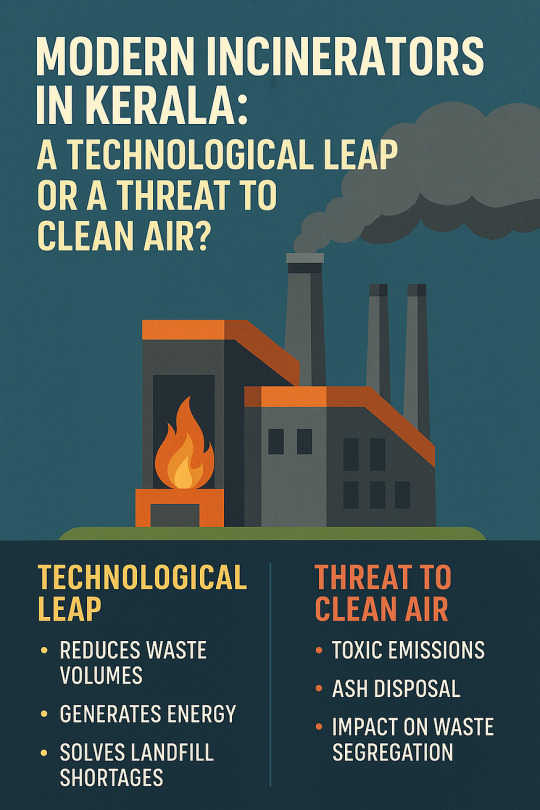
As Kerala continues to face mounting pressure from growing waste volumes, the use of incinerators is emerging as a high-tech solution. But with rising concerns about environmental health and long-term sustainability, one question remains: are incinerators in Kerala a step forward or a step too far?
What Are Incinerators and How Do They Work?
Incinerators are waste treatment systems that burn solid waste at high temperatures, reducing waste volume and sometimes generating energy in the process. These systems are often promoted as quick, space-saving alternatives to landfills — especially in urban areas.
Why Kerala Is Turning to Incinerators
With limited landfill space and inefficient waste segregation, many municipalities in Kerala are exploring incineration as a stopgap measure. Some of the driving factors include:
Urbanization and space constraints
Unsegregated waste piling up in cities
Public pressure for faster waste disposal solutions
Increased funding for waste-to-energy projects
Environmental and Health Concerns
While incinerators reduce waste volume, their impact on air quality and public health is a growing concern. Here’s why environmental experts are sounding the alarm:
Toxic Emissions: If not properly maintained, incinerators release harmful gases like dioxins and furans.
Ash Disposal: The leftover ash still requires safe disposal and may contain toxic heavy metals.
Impact on Waste Segregation: Incineration may discourage recycling and composting practices.
Cleaner Alternatives Gaining Ground
Several eco-conscious communities in Kerala are turning to better alternatives like:
Biogas plants for organic waste
Recycling and upcycling programs
Decentralized waste management models
These solutions aim to tackle waste at the source while promoting sustainability.
Final Verdict
Modern incinerators in Kerala may offer short-term relief from mounting waste issues, but they come with long-term environmental risks. To truly manage waste responsibly, Kerala must balance technology with eco-conscious practices, ensuring cleaner air and a healthier future for all.
#biogas in kerala#biogas plant for home#incinerator manufacturers in kerala#portable biogas plant for home#biogas#kerala#incinerators in kerala
0 notes
Text
Efficient Trommel Screen Machine for Waste Separation
The Trommel Screen Machine from Envcure offers efficient and reliable waste separation for solid waste management systems. Designed for high-performance screening, it effectively segregates materials by size, enhancing recycling and disposal efficiency. Ideal for municipal and industrial applications, this durable machine ensures smooth operation and reduced maintenance. Choose Envcure for smart waste solutions.
0 notes